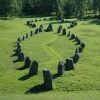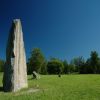|
JEM Genealogy
Ornes Moore Motley Echols Edwards Fackler Parsons Reynolds Smith Brown Bruce Munger Beer Kern Viele Nims Baker Bondurant Von Krogh Magnus Munthe and others |
King of Sweden Anund Ingvarsson
-
Name Anund Ingvarsson Title King of Sweden Birth 630 Västergötland, Sweden 
Gender Male Name Swedish King Bröt-Anund Onund Ingvarsson, King of Sweden Death 674 Svitjod, Sweden 
Person ID I36961 Master Last Modified 23 Sep 2019
Father King of Sweden Ingvar Eysteinnssen Family ID F8848 Group Sheet | Family Chart
Children + 1. Ingjald Illråde, b. 660, Uppsala, Sweden  d. 685, Röning, Tosterön, Sweden
d. 685, Röning, Tosterön, Sweden  (Age 25 years)
(Age 25 years)Family ID F8847 Group Sheet | Family Chart Last Modified 9 Jul 2019
-
Photos 
Stone Ship at Anund's Barrow 
Anund's Mound in Västerås 
Anundshög,_Västerås 
Anundshög,_Västerås 
Anundshög,_Västerås
-
Notes - Anund, Swedish: Bröt-Anund meaning trail-blazer Anund or Anund the Land Clearer; alternate names Brøt-Anundr (Old East Norse) or Braut-Önundr (Old West Norse), was a semi-legendary Swedish king of the House of Yngling who reigned in the mid-seventh century.[1] The name would have been Proto-Norse *Anuwinduz meaning "winning ancestor".
In his Ynglinga saga, Snorri Sturluson relates that Anund succeeded his father Ingvar on the Swedish throne, and after his father's wars against Danish Vikings and Estonian pirates, peace reigned over Sweden and there were good harvests. Anund was a popular king who became very rich, not only because of the peace and the good harvests but also because he avenged his father in Estonia. That country was ravaged far and wide and in the autumn Anund returned with great riches.
In those days Sweden was dominated by vast and uninhabited forests, so Anund started making roads and clearing land and vast districts were settled by Swedes. Consequently, he was named Bröt-Anund. He made a house for himself in every district and used to stay as a guest in many homes.
One autumn, King Anund was travelling between his halls (see Husbys) and came to a place called Himinheiðr (sky heath) between two mountains. He was surprised by a landslide which killed him.
After presenting this story of Anund, Snorri Sturluson quotes Þjóðólfr of Hvinir's Ynglingatal:
Varð Önundr
Jónakrs bura
harmi heptr
und Himinfjöllum,
ok ofvæg
Eistra dólgi
heipt hrísungs
at hendi kom;
ok sá frömuðr
foldar beinum
Högna hrörs
um horfinn var.[1]
We all have heard how Jonkur's sons,
Whom weapons could not touch, with stones
Were stoned to death in open day,
King Onund died in the same way.
Or else perhaps the wood-grown land,
Which long had felt his conquering hand,
Uprose at length in deadly strife,
And pressed out Onund's hated life.[2]
The Historia Norwegiæ presents a Latin summary of Ynglingatal, older than Snorri's quotation (continuing after Ingvar):
Iste ergo genuit Broutonund, quem Sigwardus frater suus occidit in Himinheithi,[3] quod loci vocabulum interpretatur coeli campus. Post istum filius suus Ingialdr [...].[4]
Yngvar bred Braut-Ånund, whose brother, Sigurd, laid him low in Himinheid, a place-name which means 'field of heaven'. After him his son Ingjald [...][5]
The original text of Ynglingatal is hard to interpret, and it only says that Anund died und Himinfjöllum (under the sky mountains) and that stones were implied. According to Historia Norwegiæ, he was murdered by his brother Sigvard in Himinherthy (which the source says means "the fields of the sky", cœli campus. Such a place name is not known and Birger Nerman suggests that the original place of death was under the sky mountains, i.e. under the clouds (cf. the etymology of cloud). Consequently, he may have been killed outdoors, by his brother and with a stone. In the translation above, Laing has made the same interpretation as Nerman.
Thorsteins saga Víkingssonar says that Anund was not the son of Ingvar, but the son of his grandfather Östen. It also relates that he had a brother named Olaf who was the king of Fjordane.
All sources say that Anund was the father of the infamous Ingjald ill-ruler.
- Anund, Swedish: Bröt-Anund meaning trail-blazer Anund or Anund the Land Clearer; alternate names Brøt-Anundr (Old East Norse) or Braut-Önundr (Old West Norse), was a semi-legendary Swedish king of the House of Yngling who reigned in the mid-seventh century.[1] The name would have been Proto-Norse *Anuwinduz meaning "winning ancestor".
This site powered by The Next Generation of Genealogy Sitebuilding v. 14.0.2, written by Darrin Lythgoe © 2001-2024.
Maintained by John Moore. | Data Protection Policy.



